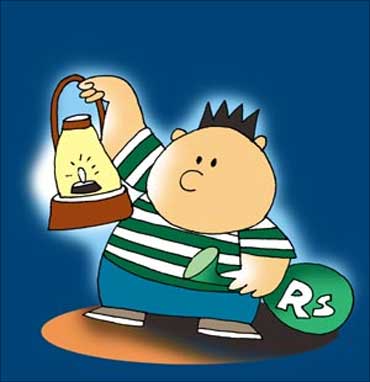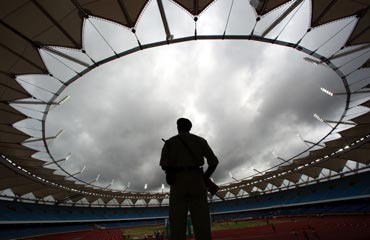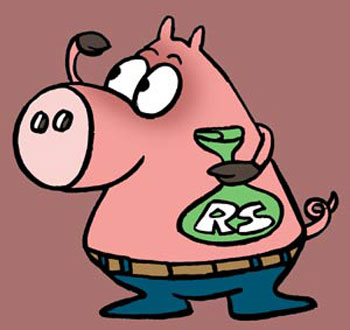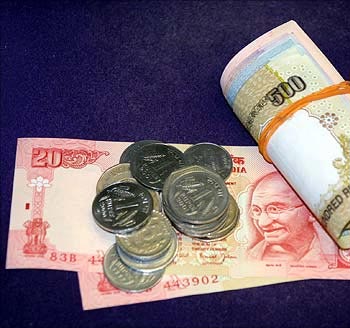Shubhashis Gangopadhyay
Both newspapers and radio channels have been educating the public about traffic movements during the upcoming Commonwealth Games. We are being told that roads leading into and out of Game venues, and athletes' residences, will have lanes marked with blue diamonds.
Vehicular traffic connected with the Games only will be allowed on these lanes. This will allow athletes and Game officials to move to and fro without being stuck in traffic and missing Game events. A lot of effort is being put in to train motorists, bus drivers, cyclists and others to stay away from these lanes.
And, to drive home the point that it is important to do so, a Rs 2,000 fine has been imposed on anyone who violates this during the Games. Of course, how this fine will be collected from a poor cyclist remains to be seen. Maybe, they will not be allowed on these roads anyway.
Nevertheless, there are a few lessons we learn from this. First, there has been very little opposition to this move. We love our country and are proud of it. Athletes, officials and spectators from all over the world will be visiting India at that time and we do not want them to be stalled in the traffic chaos of Delhi.
They will then go back to their respective countries with fond memories from India and we will all feel proud to be Indians.
Second, we are law-abiding people with great appreciation for the activities of officialdom if it helps the country's good name abroad. Even though the fine is a steep Rs 2,000, there has been very little opposition to that.
. . .
CWG: Bribes may drop due to traffic discipline
Photographs: Reuters
Usually, no one pays the actual fine on an ordinary day for routine violations like driving on the wrong side of the road or jumping a red light. Fines for these offences are Rs 100-200 only and we gladly pay half of that to the police, and no one is the wiser about who violated what.
But this time around, we know we cannot get by with half the fine for the police will not accept it and so, we might as well follow the rule.
Third, and most importantly, we are very docile people who are ready to bear all the traffic hardships that the Games will bring. Even though congestion will increase on the roads with fewer lanes, I am pretty confident that no outsider will have any inkling of the road rages that Delhiites usually succumb to.
In the meantime, some offices have already committed themselves to helping out their employees and have decided to keep their establishments closed during the Games.
Now, let us for one moment think that all of the above are not just a new-found set of desirable characteristics in Delhiites but a more inherent set of qualities that the Games have helped us tap into. How will life after the Games be different from that before them?
. . .
CWG: Bribes may drop due to traffic discipline
Photographs: Reuters
We will continue to be proud of our country. But since there will be no foreigners around then, we will start feeling for our Indian cyclists and leave for them a small part of the road we travel on in our cars. The police will help us do this by fining us Rs 2,000 on the spot should we drive on the cycle lanes.
Officials will stop telling us that road rules are difficult to implement because they do not have enough personnel, or mobile units. For, by then, they will know that the Games have been a huge success in spite of their limited resources.
We will feel proud of the fact that we can survive for a month without getting out of our cars to beat up a hapless auto-rickshaw driver or squeeze out a pedestrian from the place earmarked for him.
In fact, we may go one step further. We may say that let us forget the BRT and all such complicated solutions.
Let us continue with the blue diamond lanes but keep them reserved for buses, taxis and cars with at least two passengers plus one driver. We may even discover an inherent smartness in us and realise that this will also make the other lanes move faster.
. . .
CWG: Bribes may drop due to traffic discipline
Photographs: Reuters
For one, the buses and the taxis will stay off them. For another, since some commuters enter car-pools, the number of single-passenger cars will be less. And then, since buses will move much faster than traffic in the other lanes, more people will forget their cars and start taking buses.
They will clamour for more buses and Delhi's public transport will expand. Demand for fuel will fall and pollution will decline in India without judges and activists having to hold the government to ransom.
And most importantly, we will have learnt a profound lesson. Big fines may mean that higher bribes are demanded, but certainly not that higher bribes are paid. For, as fines go up leading to an increase in the bribe rates, the cost of breaking a rule also goes up.
This reduces violations. With lesser violations, a lesser number of bribes are offered. And, suddenly, we have a society where corruption is no longer the usual thing.
This is not because we have all become honest. Instead, we have stopped breaking rules because the cost of breaking a rule is too high. We will have then started realising that it does not matter who gets the money we pay, but that we have to pay.
Maybe this is all a dream and we will get back to our usual ways once the Games are over. But if we are to dream, why not dream something big. Especially when we are sure that everyone who matters will reach the Games on time.
<P><B>The author is research director, India Development Foundation.</B>
<P><iframe hspace=0 vspace=0 scrolling=no src="http://badges.pages.rediff.com/promote/Best-of-Business/68709?orientation=1" frameborder=0 width=227 height=74 ></iframe>






article